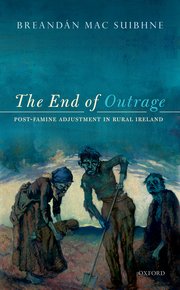 From the time that the blight first came on the potatoes in Ireland in 1845, armed and masked men dubbed Molly Maguires had been raiding the houses of people deemed to be taking advantage of the rural poor. On some occasions, they represented themselves as "Molly's Sons," sent by their mother, to carry out justice; on others, a man attired as a woman, introducing "herself" as Molly Maguire, demanding redress for wrongs inflicted on her children. The raiders might stipulate the maximum price at which provisions were to be sold, warn against the eviction of tenants, or demand that an evicted family be reinstated to their holding. People who refused to meet their demands were often viciously beaten and, in some instances, killed-offences that the Constabulary classified as "outrages." Catholic clergymen regularly denounced the Mollies and in 1853, the district was proclaimed under the Crime and Outrage (Ireland) Act. Yet the "outrages" continued.
From the time that the blight first came on the potatoes in Ireland in 1845, armed and masked men dubbed Molly Maguires had been raiding the houses of people deemed to be taking advantage of the rural poor. On some occasions, they represented themselves as "Molly's Sons," sent by their mother, to carry out justice; on others, a man attired as a woman, introducing "herself" as Molly Maguire, demanding redress for wrongs inflicted on her children. The raiders might stipulate the maximum price at which provisions were to be sold, warn against the eviction of tenants, or demand that an evicted family be reinstated to their holding. People who refused to meet their demands were often viciously beaten and, in some instances, killed-offences that the Constabulary classified as "outrages." Catholic clergymen regularly denounced the Mollies and in 1853, the district was proclaimed under the Crime and Outrage (Ireland) Act. Yet the "outrages" continued.
Central to The End of Outrage, the Irish Times Irish Nonfiction Book of the Year for 2017, is the story of a schoolmaster, Patrick McGlynn, who turned informer on the Molly Maguires, the nationalist secret society, in 1856. The following year Dublin Castle sent McGlynn to Australia– and, there, after 1862, the author Breandán Mac Suibhne lost sight of him. Now, with Jonathan Wooding, a historian and a direct descendant of the informer, he picks up the trail.
No comments:
Post a Comment